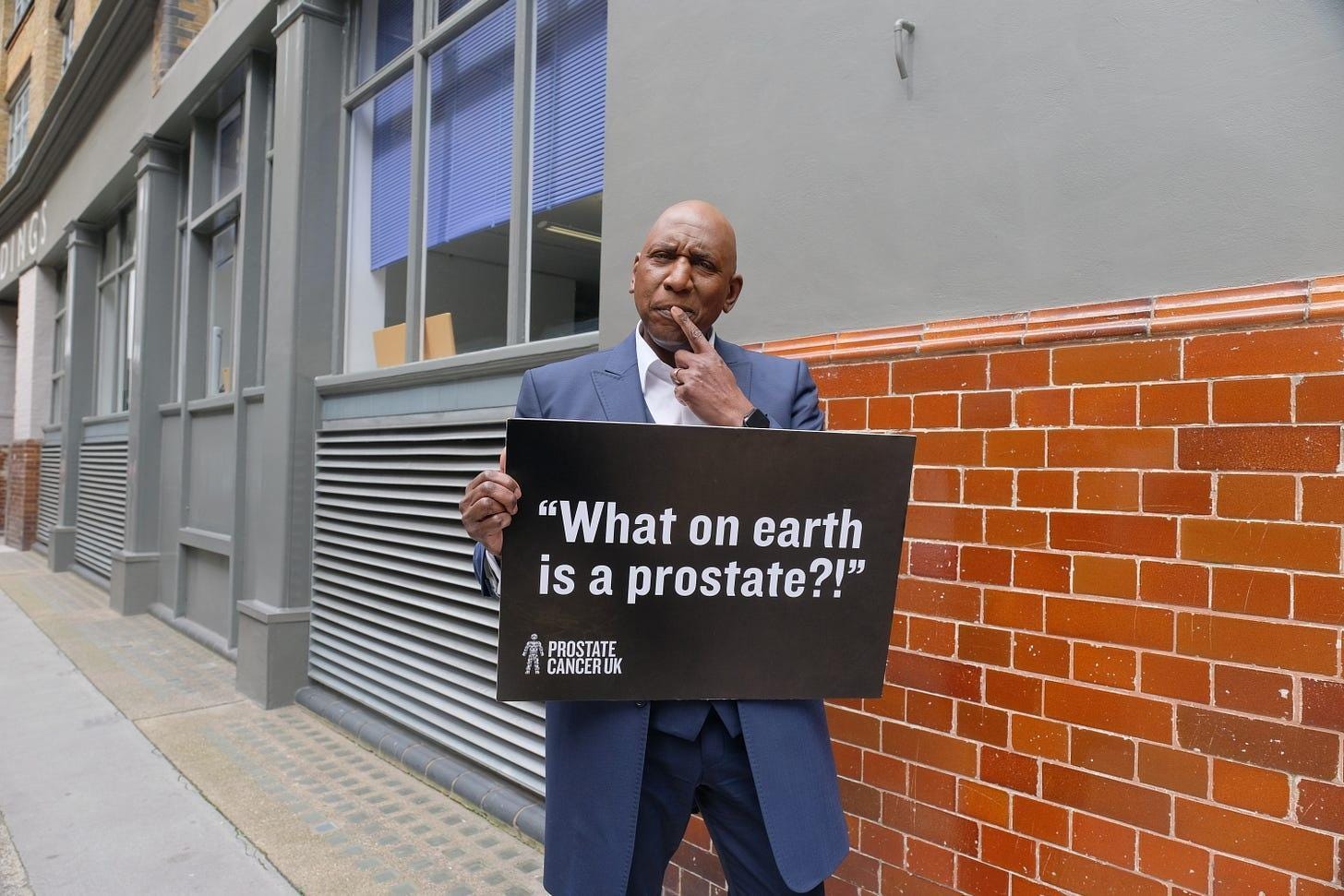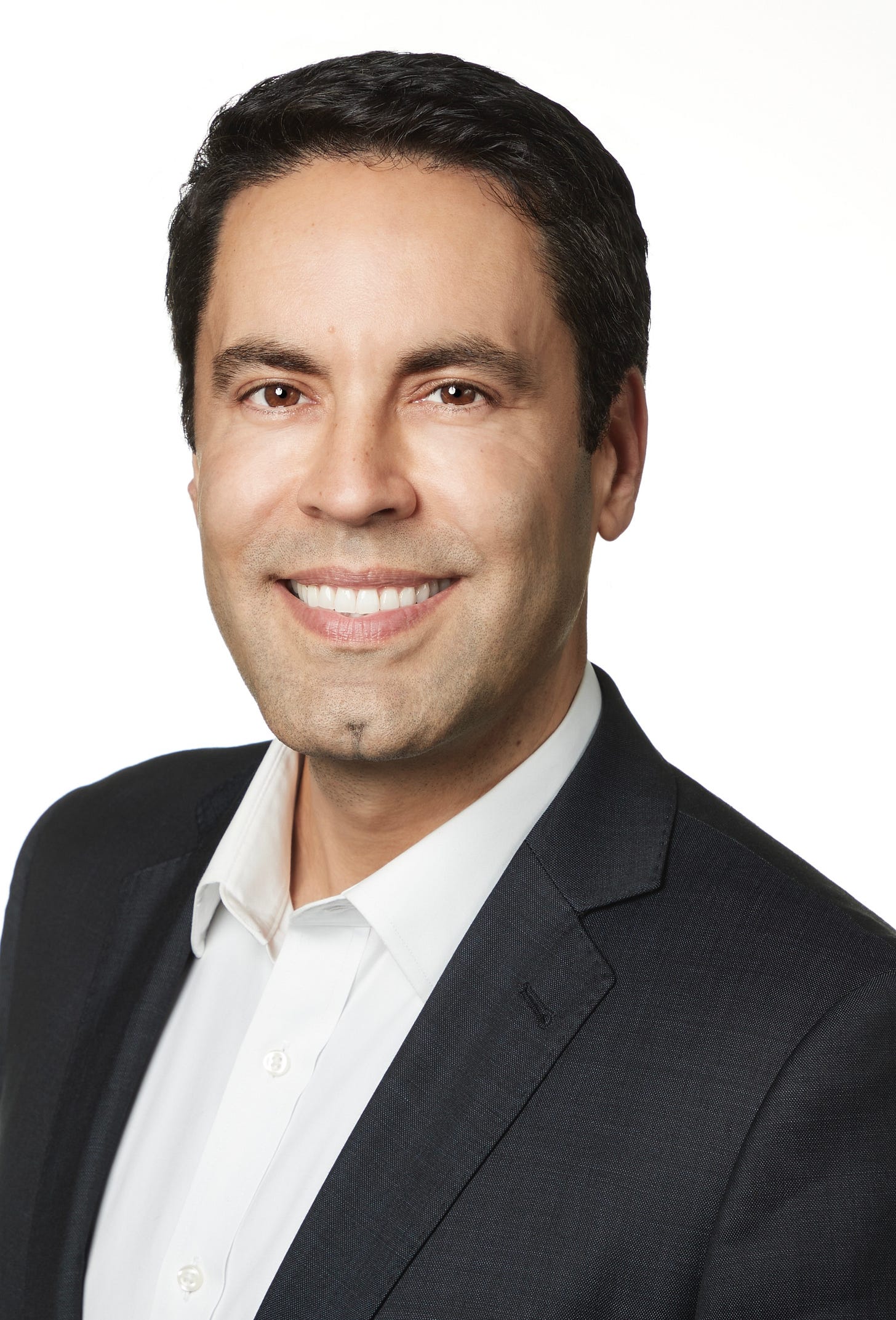Colin McFarlane, British actor of ‘Dark Knight’ fame, diagnosed with low-risk prostate cancer, taking on high-profile role in PCa awareness
'Let's save some lives and some prostates, Howard'--Colin McFarlane
By Howard Wolinsky
In the “Dark Knight” Batman series, Police Commissioner Gillian Loeb, played by British actor Colin McFarlane, was poisoned by none other than the Joker, the archest of archvillains in the Batman Universe.
Bad break for the Commish, right?
(Colin McFarlane—photo by Ray Burmiston)
Aces in the hole
In real life, McFarlane was diagnosed with low-risk (Gleason 6) prostate cancer last December. But he’ll survive this one. He got an ace this time around, not a joker.
McFarlane is thriving. He has no symptoms and, therefore, requires no aggressive treatment. Instead, he’s on “Active Surveillance,” which simply means close monitoring.
Good break for the actor. There are far worse options than low-risk prostate cancer.
McFarlane, who The Active Surveillor interviewed recently, knows low-risk prostate cancer is unlikely to kill him, but he also wanted to go public and inform other men about the importance of screening for prostate cancer. This is a major issue in the UK, where prostate cancer has surpassed breast cancer as a killer and has become the most common cancer in British men. (https://www.bbc.com/news/health-51263384)
McFarlane is blazing a new trail as apparently the first actor with low-risk prostate cancer to take a high-profile role to campaign for prostate screening and, in doing so, hopefully raising the flag for AS awareness, too.
(Colin McFarlane as Commissioner Loeb in the ‘Dark Knight’ series.)
Most of us on AS can keep to our own counsel. We’re not being treated, so we don’t need to take time off from our jobs for surgery or radiation treatments. Still, many men on AS (about 25%) don’t even inform their family members, bosses, or business associates that they have prostate cancer because they fear stigma and bias.
Like other actors, McFarlane faces a different set of issues while considering going public with his diagnosis: It potentially could wreck his career.
The actor’s dilemma
British actor, writer, and comedian Stephen Fry, who was treated for advanced prostate cancer, has explained the actor’s dilemma well. In an article in Nature in 2019, he noted that the first thing an actor does after being offered a major role is undergo a physical exam for health clearance so insurers can approve their participation in the project. (https://www.nature.com/articles/s41585-019-0152-z)
Insurers in the entertainment industry just see the word “cancer” and insist that the patient be treated aggressively before green-lighting projects. That’s the opposite approach the rest of us have with Active Surveillance.
Initially, McFarlane didn’t realize the risk he could be taking while making history as apparently the first actor on Active Surveillance for low-risk prostate cancer to go public and campaign for prostate cancer awareness.
A veteran English actor, who had a prostatectomy many years ago, told McFarlane about his “cancer journey.”
When he heard McFarlane might go public, he offered some advice: “Do you really want to be the poster boy for prostate cancer? There is so much ignorance about cancer. I'm 80, Colin, so I don't mind talking about it now because my career is kind of over. But you're only 61. And if you don't mind me saying, you're a young 61. You look like you've got a lot of your career left. You’d be a brilliant spokesperson, but think it through first.”
Something he had to do
But after talking to other friends and people in the industry and recognizing the massive ignorance around prostate cancer, McFarlane concluded that speaking out about prostate cancer “was something I had to do.”
He explained: “The public needs to be educated that language about ‘living with cancer’ is something we'll all be doing more of. When it's caught early, people need to understand that living with cancer is now becoming more and more normal. So my industry shouldn't be getting scared about this because it's not really going to affect anything that I do.
His urology specialist told him: “You're unlikely to need treatment for 10 to 15 years, if at all. The key phrase being ‘if at all.’ He said, ‘You're more likely to have something else happen to you, to be quite honest, other than prostate cancer.’ As my wife said, she’s more likely to kill me than prostate cancer!
“My specialist added: ‘As you knew your risk you've caught it early so we're now going to monitor you with a PSA blood test every three months and an MRI once a year. I only wish more men did what you’ve done and had regular PSAS so other men can catch it early like you did.’”
Those words resonated with McFarlane and persuaded him to take a stand, come what may.
In June, on Father’s Day, he released a public service announcement about his low-risk prostate cancer, joining forces with the charity Prostate Cancer UK (see accompanying story) to support their prostate awareness campaign.
McFarlane, a spiritual man and a practicing Buddhist, plans to stick with his campaign to make men aware of the need to screen for prostate cancer and create positive change.
“I now know so much about prostate cancer that if I sit on this information and don't try and educate men, I won't feel good about myself. It’s something I feel the need to do,” he said.
Actor McFarlane with low-risk prostate cancer blazing a new trail in advocacy
By Howard Wolinsky
When I interviewed actor Colin McFarlane, I told him I had been waiting for him for 13 years.
I have long searched for a celeb to speak out on behalf of low-risk prostate cancer and Active Surveillance, the close monitoring approach used to manage our cases. I think we have found our ideal “poster child” for AS in McFarlane.
McFarlane was diagnosed with three cores of Gleason 6 (Grade Group 1) last December and has been promoting prostate cancer awareness in Britain for Prostate Cancer UK since June.
(Colin McFarlane—photo by Ray Burmiston)
As a Father’s Day “gift” to UK men, McFarlane, best known as “Commissioner Loeb” in the “Dark Knight” movie series and “Ulysses” in “Outlander,” told British men about the need for prostate cancer screening using PSA (prostate-specific antigen) blood levels starting at around age 50 in white men and around age 45 in Black men like him.
He released a public service announcement through Prostate Cancer UK: https://prostatecanceruk.org/about-us/news-and-views/2023/06/colin-mcfarlane-shares-prostate-cancer-diagnosis
McFarlane and PC UKalso ran a campaign busting myths about prostate cancer online, in the newspapers, and on the radio. This potent campaign busts myths about PCa: https://prostatecanceruk.org/prostate-information-and-support/risk-campaign/mhw-mythbusting
As we Yanks say, McFarlane walloped one out of the ballpark: Ka-pow! Bam! as they say in Batman comica.
The McFarlane effect
McFarlane scored a direct hit. After an appearance on the BBC ‘Breakfast Show’, he crashed the Prostate Cancer UK’s website. More than 100,000 men in the UK were screened for prostate cancer.
That’s amazing. The McFarlane effect may have set some sort of advocacy record for prostate cancer, in fact.
In 2018, a similar Fry/Turnbull effect was reported British actor Stephen Fry and BBC Breakfast presenter Bill Turnbull went public with their treatments for advanced prostate cancer. Britain’s National Health Service reported that from April to July 2018, 14,479 patients received treatment for a urological cancer - an increase of 3,929 (36%) compared to the same period in 2017.
Power to the celebs
Star power can be harnessed for good. Why not, at long last, for AS and low-risk prostate cancer?
Over the years, I have tried to enlist the help of a couple of celebs who were on AS for low-risk prostate cancer. (Here’s an article I did about public figures and their diseases: https://www.medpagetoday.com/special-reports/apatientsjourney/82226)
Many British celebs have spoken out for prostate cancer awareness there, including McFarlane, Fry, Jim Broadbent, Elton John, and Rod Stewart, along with sports figures and national newsreaders.
But the issues in the UK and U.S. are not the same regarding prostate cancer.
Lack of knowledge about the importance of prostate cancer screening is more of a UK problem. The U.S. has a semblance of a national PSA screening program with half-hearted support of screening guidelines from the U.S. Preventive Services Task Force. The UK doesn’t have such guidelines.
Roughly 40-50% of American men 50 and above get screened with PSA blood levels.. Only 20% of our British counterparts are screened.
Meanwhile, many American celebs have spoken out about advanced prostate cancer, including Senator and presidential candidate Bob Dole, LA Dodgers manager Tommy Lasorda, singer and actor Harry Belafonte, U.S. General and Secretary of State Colin Powell, and the late golfer Arnold Palmer. (All are deceased.)
Where have all the low-risk celebs gone?
I attempted to enlist Sir Ian McKellen (“Gandalf the Grey” in the Hobbit series) for the role of AS “poster boy.” He eluded me.
McKellen came out of the closet as a gay man and became an activist for gay rights. But he apparently had remained in the closet about his low-risk prostate cancer for many years, seemingly reluctant to assume a public role as a man with low-risk prostate cancer.
That’s his business, of course. And again, the issues in UK for prostate cancer are different. There, national health policy sends men with low-risk prostate cancer on the path to AS.
The uptake of AS in the UK is over 90% compared with 60% in the U.S.
I was aware of only one other actor on AS--Bill Duke, best known for his roles in Arnold Schwarzenegger movies, such as “Predator.” Duke spoke out in a video with his famed medical oncologist, Mark Scholz, MD, co-founder of the Prostate Cancer Research Institute and co-author of “The Invasion of the Prostate Snatchers.”
AS can be a hard sell. It involves living with cancer when all our instincts and education tell us to cut, radiate, nuke, burn, or freeze it. Out, out damned spot, right?
About image and low-risk disease
Living with even low-risk prostate cancer remains a foreign concept to the public and maybe even more foreign to the “suits” in McFralane’s world: the agents, managers, and entertainment industry execs.
There's a potential image problem for actors in having cancer. Their profession generally demands that they appear young and vibrant. A lingering Gleason 6 cancer diagnosis might make them appear vulnerable. News of having prostate cancer—even if it were low-risk—may not be viewed by the movie execs as a friend to a celeb's career and may be considered a risk to completing a major project.
Cancer is still cancer to many, apparently, even if it is as insipid as weak tea, as is the case with Gleason 6.
I took a chance and asked McFarlane if he could help the AS movement in the U.S. with some PSAs--not the blood tests, but public service announcements--on how AS is underused in the U.S. and how AS is a safe option for Black men with low-risk prostate cancer.
To my astonishment, he agreed.
McFarlane told me: “Listen, if we can change the world, Howard, and save more lives, and save more prostates, let's do it.”
Stay tuned.
Prostate Cancer isn’t just a young man’s disease—The Gabe Canales story
By Howard Wolinsky
Gabe Canales and I have a lot in common.
We both were diagnosed with a single core of low-risk prostate cancer in 2010. We both went on Active Surveillance.
But there was a difference—like 27 years.
I was 62—about average for the diagnosis of PCa.
Canales, a Texas marketing and PR guy, was only 35.
I drift into trying support and advocate for the old guys with prostate cancer. Canales has been working to help young men with prostate cancer and good health—a topic to which young and men old men alike often devote little attention.
Canales wrote a book “Unexpected Diagnosis,” about his unusual “cancer journey,” finding himself with an “old man’s disease” at a young age. (90% of men with prostate cancer are 55 and above.)
(Gabe Canales of BlueCure.org)
Initially, he focused on prostate cancer, extremely rare in his age bracket. Then, he broadened his approach to promote good health in young men through the Blue Cure Foundation..
I wrote a profile on him, which appeared in MedPage Today over the Labor Day weekend. Read about Canales here: https://www.medpagetoday.com/special-reports/apatientsjourney/106156
(Gabe Canales (right) and Houston Mayor Sylvester Turner after doing a PSA.)
Laughing your prostate off in the Gleason awards—deadline extended
By Howard Wolinsky
Submit your prostate jokes, cartoons, limericks, whatever—on DREs, PSAs, BPH, and prostatitis—to The Gleasons—Putting The Glee In Gleason Scores, the first prostate humor contest.
The contest, started by Jim-Bob Williams, a therapeutic humorist and Gleason 6 patient, and me, is open to doctors and patients alike. The deadline has been extended to Sept. 15 to help out some stragglers.
Share your prostate humor at howard.wolinsky@gmail.com. Shaggy dogs, one-liners, limericks, poems, cartoons, whatever floats your boat. We do play blue, so ED and Viagra jokes are fair play.
A “distinguished” panel will announce the winners later in September, Prostate Cancer Awareness Month.
(Sir Billy.)
In the professional division, AnCan Foundation has nominated Sir Billy Connolly’s over-the-top prostate exam bit: https://ancan.org/billy-connolly-prostate-examination/
Guaranteed that you’ll laugh your prostate—and ass—off.
It’s Pca Awareness Month. Why not catch some free webinars?
—PHEN (Prostate Health Education Network) will address issues relating to AS and Black men in a webinar, the 19th Annual “African American Prostate Cancer Disparity Summit” 1-3:30 p.m. Eastern Sept. 6. 2023. Register here: https://tinyurl.com/mu7ebh4d
—Active Surveillance Patients International (ASPI) is sponsoring a free webinar on lifestyle research and low-risk prostate cancer from 12-1:30 p.m. Eastern, Saturday Sept. 30. Register here for “Applied Research and Lifestyles and Low-Risk Prostate Cancer: https://zoom.us/meeting/register/tJwvdOGoqjwuE9CC8AI45nYdsj63e-iUnop6
—Want to learn about focal therapy? Listen to AS pioneer Dr. Laurence Klotz: https://ancan.org/webinar-is-focal-therapy-right-for-your-prostate-cancer/
—Lifestyle? Catch ASPI’s webinar with Dr. Stacy Loeb, of NYU, on lifestyle factors, such as diet. Great talk on a plant-based diet: https://aspatients.org/meeting/as-101-program-on-diet-and-nutritional-lifestyle/









